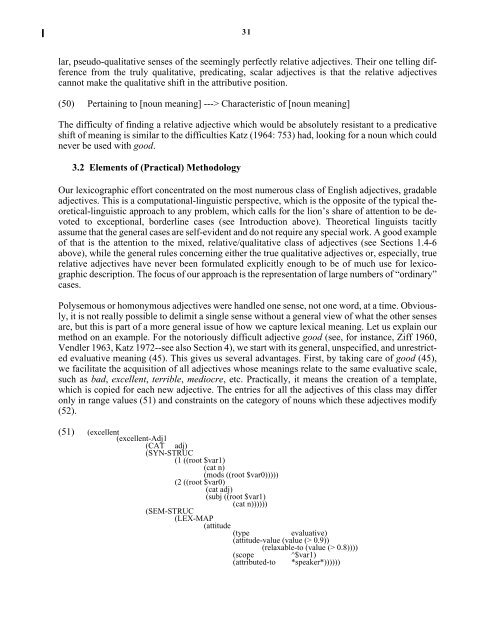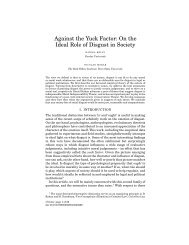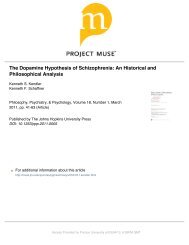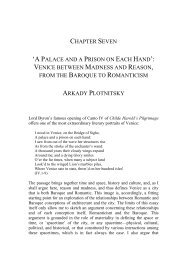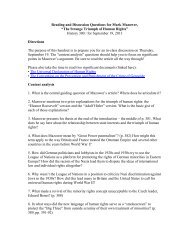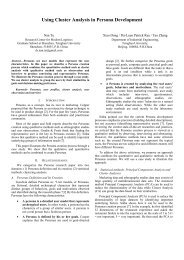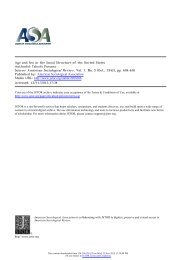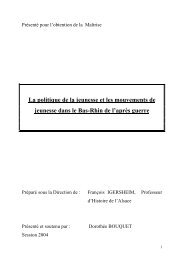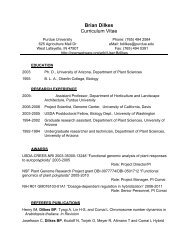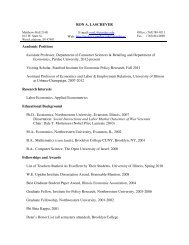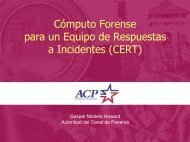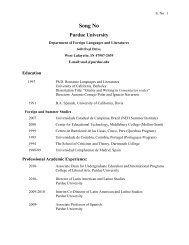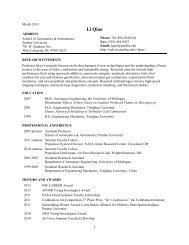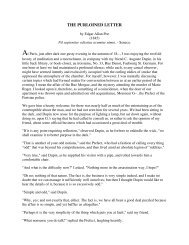Lexical Semantics of Adjectives - CiteSeerX
Lexical Semantics of Adjectives - CiteSeerX
Lexical Semantics of Adjectives - CiteSeerX
Create successful ePaper yourself
Turn your PDF publications into a flip-book with our unique Google optimized e-Paper software.
31<br />
lar, pseudo-qualitative senses <strong>of</strong> the seemingly perfectly relative adjectives. Their one telling difference<br />
from the truly qualitative, predicating, scalar adjectives is that the relative adjectives<br />
cannot make the qualitative shift in the attributive position.<br />
(50) Pertaining to [noun meaning] ---> Characteristic <strong>of</strong> [noun meaning]<br />
The difficulty <strong>of</strong> finding a relative adjective which would be absolutely resistant to a predicative<br />
shift <strong>of</strong> meaning is similar to the difficulties Katz (1964: 753) had, looking for a noun which could<br />
never be used with good.<br />
3.2 Elements <strong>of</strong> (Practical) Methodology<br />
Our lexicographic effort concentrated on the most numerous class <strong>of</strong> English adjectives, gradable<br />
adjectives. This is a computational-linguistic perspective, which is the opposite <strong>of</strong> the typical theoretical-linguistic<br />
approach to any problem, which calls for the lion’s share <strong>of</strong> attention to be devoted<br />
to exceptional, borderline cases (see Introduction above). Theoretical linguists tacitly<br />
assume that the general cases are self-evident and do not require any special work. A good example<br />
<strong>of</strong> that is the attention to the mixed, relative/qualitative class <strong>of</strong> adjectives (see Sections 1.4-6<br />
above), while the general rules concerning either the true qualitative adjectives or, especially, true<br />
relative adjectives have never been formulated explicitly enough to be <strong>of</strong> much use for lexicographic<br />
description. The focus <strong>of</strong> our approach is the representation <strong>of</strong> large numbers <strong>of</strong> “ordinary”<br />
cases.<br />
Polysemous or homonymous adjectives were handled one sense, not one word, at a time. Obviously,<br />
it is not really possible to delimit a single sense without a general view <strong>of</strong> what the other senses<br />
are, but this is part <strong>of</strong> a more general issue <strong>of</strong> how we capture lexical meaning. Let us explain our<br />
method on an example. For the notoriously difficult adjective good (see, for instance, Ziff 1960,<br />
Vendler 1963, Katz 1972--see also Section 4), we start with its general, unspecified, and unrestricted<br />
evaluative meaning (45). This gives us several advantages. First, by taking care <strong>of</strong> good (45),<br />
we facilitate the acquisition <strong>of</strong> all adjectives whose meanings relate to the same evaluative scale,<br />
such as bad, excellent, terrible, mediocre, etc. Practically, it means the creation <strong>of</strong> a template,<br />
which is copied for each new adjective. The entries for all the adjectives <strong>of</strong> this class may differ<br />
only in range values (51) and constraints on the category <strong>of</strong> nouns which these adjectives modify<br />
(52).<br />
(51) (excellent (excellent-Adj1<br />
(CAT adj)<br />
(SYN-STRUC<br />
(1 ((root $var1)<br />
(cat n)<br />
(mods ((root $var0)))))<br />
(2 ((root $var0)<br />
(cat adj)<br />
(subj ((root $var1)<br />
(cat n))))))<br />
(SEM-STRUC<br />
(LEX-MAP<br />
(attitude (type evaluative)<br />
(attitude-value (value (> 0.9))<br />
(relaxable-to (value (> 0.8))))<br />
(scope ^$var1)<br />
(attributed-to *speaker*))))))


